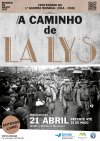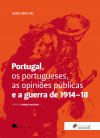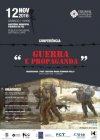O jornal online DEP, Deportes, Exiles, Refugees (www.unive.it/dep) organiza nos dias 27 e 28 de Novembro de 2014 um encontro internacional em Veneza.
O tema será o das experiências femininas durante a guerra, pensamento feminista, especialmente o relacionado com a dicotomia guerra/paz, e as acções e comportamentos que caracterizaram a visão feminina destes assuntos.
Refere a organização:
«The online journal dedicated to women’s memory, DEP. Deportees, Exiles, Refugees (www.unive.it/dep), is organising an international conference on women and the First World War to be held in Venice on 27th and 28th November 2014. The themes of the conference will bring together women’s experiences of war, feminist thought on the war/peace dichotomy, and the actions and behaviours that actualised the female vision of the issues and suffering brought about by the war. In methodological terms, preference will be given to subjective and collective perspectives in order to move beyond the conventional images and representations produced by wartime "deployment".
The conference is divided into two main sections:
I. Living war/thinking/seeking peace.
The conference is divided into two main sections:
I. Living war/thinking/seeking peace.
Highlighting the different way women experience war, this section will deal with the contradictions, struggle with change, the different wartime experience, women’s words and experiences that express not only their suffering, but also their courage, feelings, family and social relationships that were severely tested during the war. The themes proposed in this section are:
1. Women, war and the struggle with change: The war accelerated social and economic processes, altering personal and professional identities, customs, social relationships and affecting family and community structures. This section aims to bring to light the "struggle" that accompanied these changes, and the new dimension everyday life and work took on. Research fields to be explored might include: care within the family; the conflicts, ambiguities and contradictions involved in women’s work outside the home; the way women "interpreted" and experienced the war: practices, skills and behaviours generated during the war; social relations within the community: solidarity, disputes, deployment and isolation; demobilization and return to peacetime; November 1918: the "return" of men / the "return" of women.
2. Women and violence: Women experienced direct or mediated wartime violence both in border areas and also in "domestic frontlines". Research into the different ways "endured" violence was articulated (deportation, internment, occupation, bombings, displacement; poverty and prostitution), and the little-investigated topic of hunger and food shortages is invited. Emphasis may be placed on hardship but also on the valorisation of the individual and collective strategies adopted to cope with these dramatic events.
3. Voices/words of suffering, love and peace. As the war imposed long separations, it was also experienced through women’s often unpublished writings that captured reflections, events, and feelings. We would like to invite research exploring the conceptualization and expression of the new wartime condition, the prolonged absence of sons and husbands, the state of suspension and anguish determined by the dramatic reality of the war, the search for affection and "regeneration" of married and family life, the hope for peace, and the changes in social structure.
II. Thinking/acting for peace. The feminist approach to relations among nations and the experiences of aid and solidarity.
In this section the conference aims to explore the theme of feminist and pacifist thought with regard to international relations, relations among nations, the need to develop non-violent strategies and practices to improve or make peace a possible alternative to war and to national/international claims. Space will be reserved for the analysis of the political route that led the forerunners of the international suffragist moment to rally for peace, promoting the International Women’s Congress that opened in The Hague on 28
th April 1915. The results of the Congress, in particular the proposal to work towards a mediated solution to the war to obtain peace with neither winners nor losers, open up to the investigation of foreign policy inspired by pacifist and feminist principles set out by the Women’s International League for Peace and Freedom (WILPF), and to the consideration of the changes in women’s reflections and action during the war and in the post-war period. The work of women for war victims has remained undervalued and understated. In this venue, some fundamental political and theoretical implications may be foregrounded: condemnation of the nature of the war and the logic intrinsic to military organization, criticism of nationalism, the willingness to show the strength of non-violence and affirmation of women’s responsibility in international issues. Important examples might be the action of women in the Emergency Committee for the Assistance of Germans, Austrians and Hungarians in Distress, in the Auskunft-und Hilfsstelle für Deutsche im Ausland und Ausländer in Deutschland, in the Friends’ War Victims Relief Committee and, above all, in Save the Children, the organization that considered children as the symbol of a new internationalism. It was not charity but a project to bring together women’s social and voluntary work with international responsibility in the hope that new international relations might be founded on basic human needs as politics could be founded on compassion.
Normas do call
Proposals (max 2000 characters) must include: a provisional title; a description of the topic; a list of sources; a short CV and contact details of the conference speaker. They are to be sent to Este endereço de email está protegido contra piratas. Necessita ativar o JavaScript para o visualizar. by
28th February 2014 and will be processed by 31st March 2014.
If the number of proposals received is higher than the number of slots of speakers, the organizing committee will invite authors to attend the conference and to submit their written papers, which will be sent for peer-review and published in a special issue of the DEP journal (www.unive.it/dep).»
1. Women, war and the struggle with change: The war accelerated social and economic processes, altering personal and professional identities, customs, social relationships and affecting family and community structures. This section aims to bring to light the "struggle" that accompanied these changes, and the new dimension everyday life and work took on. Research fields to be explored might include: care within the family; the conflicts, ambiguities and contradictions involved in women’s work outside the home; the way women "interpreted" and experienced the war: practices, skills and behaviours generated during the war; social relations within the community: solidarity, disputes, deployment and isolation; demobilization and return to peacetime; November 1918: the "return" of men / the "return" of women.
2. Women and violence: Women experienced direct or mediated wartime violence both in border areas and also in "domestic frontlines". Research into the different ways "endured" violence was articulated (deportation, internment, occupation, bombings, displacement; poverty and prostitution), and the little-investigated topic of hunger and food shortages is invited. Emphasis may be placed on hardship but also on the valorisation of the individual and collective strategies adopted to cope with these dramatic events.
3. Voices/words of suffering, love and peace. As the war imposed long separations, it was also experienced through women’s often unpublished writings that captured reflections, events, and feelings. We would like to invite research exploring the conceptualization and expression of the new wartime condition, the prolonged absence of sons and husbands, the state of suspension and anguish determined by the dramatic reality of the war, the search for affection and "regeneration" of married and family life, the hope for peace, and the changes in social structure.
II. Thinking/acting for peace. The feminist approach to relations among nations and the experiences of aid and solidarity.
In this section the conference aims to explore the theme of feminist and pacifist thought with regard to international relations, relations among nations, the need to develop non-violent strategies and practices to improve or make peace a possible alternative to war and to national/international claims. Space will be reserved for the analysis of the political route that led the forerunners of the international suffragist moment to rally for peace, promoting the International Women’s Congress that opened in The Hague on 28
th April 1915. The results of the Congress, in particular the proposal to work towards a mediated solution to the war to obtain peace with neither winners nor losers, open up to the investigation of foreign policy inspired by pacifist and feminist principles set out by the Women’s International League for Peace and Freedom (WILPF), and to the consideration of the changes in women’s reflections and action during the war and in the post-war period. The work of women for war victims has remained undervalued and understated. In this venue, some fundamental political and theoretical implications may be foregrounded: condemnation of the nature of the war and the logic intrinsic to military organization, criticism of nationalism, the willingness to show the strength of non-violence and affirmation of women’s responsibility in international issues. Important examples might be the action of women in the Emergency Committee for the Assistance of Germans, Austrians and Hungarians in Distress, in the Auskunft-und Hilfsstelle für Deutsche im Ausland und Ausländer in Deutschland, in the Friends’ War Victims Relief Committee and, above all, in Save the Children, the organization that considered children as the symbol of a new internationalism. It was not charity but a project to bring together women’s social and voluntary work with international responsibility in the hope that new international relations might be founded on basic human needs as politics could be founded on compassion.
Normas do call
Proposals (max 2000 characters) must include: a provisional title; a description of the topic; a list of sources; a short CV and contact details of the conference speaker. They are to be sent to Este endereço de email está protegido contra piratas. Necessita ativar o JavaScript para o visualizar. by
28th February 2014 and will be processed by 31st March 2014.
If the number of proposals received is higher than the number of slots of speakers, the organizing committee will invite authors to attend the conference and to submit their written papers, which will be sent for peer-review and published in a special issue of the DEP journal (www.unive.it/dep).»









Comentários